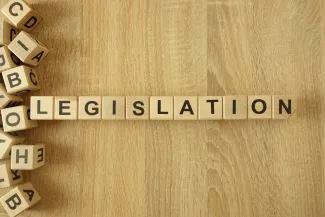
Stripped down law enforcement whistleblower protections bill passes preliminary Colorado House vote
(Colorado Newsline) The Colorado House after tense floor debate Thursday gave preliminary approval to a new version of a bill that would add protections for law enforcement whistleblowers.
The original House Bill 24-1460 would have required that law enforcement agencies investigate allegations of misconduct made against their officers and prohibited retaliation against an officer who files a complaint.

© iStock - nick1803
An amendment from the bill sponsors — which completely strikes old language and creates new language for the bill — would create a working group to continue conversations with interested parties to determine what else needs to be done regarding law enforcement retaliation and whistleblower protections.
It also would require that the Colorado Peace Officer Standards and Training Board revoke or suspend certification for an officer if a judge determines they covered up an instance of misconduct or retaliated against someone who reported alleged misconduct. If retaliation is proved, an officer whose name was wrongfully flagged in the POST database could use the retaliation as a defense to get it removed. The POST database allows the public to see police certifications, terminations and resignations, investigations and credibility disclosures among other disciplinary actions against individual officers.
The bill also clarifies that body camera footage showing officer misconduct must be released to the public unedited and at no cost. Much of the language in the bill around whistleblower protections mirrors language already in Colorado law related to health care whistleblowers.
Sponsors took up the bill at the request of law enforcement officers around the state who say they experienced retaliation. In particular, legislators repeatedly mentioned McKinzie Rees, a former Edgewater police officer who ended up with an“untruthfulness” label on the POST database because the accusations she made against a superior officer weren’t taken seriously, Rees said. The officer who she alleged assaulted her pleaded guilty to counts of unlawful sexual contact and official misconduct in January.
Under the latest version of the bill, Rees would be able to get her name cleared on the database, as she hasn’t so far been able to despite her alleged assailant’s guilty plea.
Definition of retaliation
Bill sponsor state Representative Leslie Herod, a Denver Democrat, said she and co-sponsor state Representative Jennifer Bacon, also a Denver Democrat, have “stripped this bill to the bones” after continued opposition from law enforcement leadership.
“Everything else that was initially in the bill has been stripped out,” Herod said on the House floor. “Not because we want to, but because we realized that we need to have other discussions about that.”

iStock
Herod said law enforcement opposed the potential of criminal charges for officers who fail to report alleged misconduct, as well as the ability for someone to file a lawsuit against a department should it not investigate. Bill sponsors removed those provisions in hopes of additional discussion with the newly proposed working group.
“What we have now is a working group and a clear definition of retaliation, alongside the ability to be taken out of the database if you can prove that you were retaliated against,” Herod told Newsline.
Many representatives showed concern with the last-minute process of the bill — as was the case during the bill’s Judiciary Committee hearing — but bill sponsors said they have continuously tried to engage with interested parties who are opposed to the bill. Herod said many bill opponents have said the sponsors have not been willing to engage, while she said their experience has been the opposite.
“We’ve been told we are the ones that have refused to engage, and that is just gaslighting at its finest, and just really shines a light on what is happening to these people every single day,” Herod said in reference to the whistleblowers.
Herod said officers who have been retaliated against also asked law enforcement groups for input on the bill and they were also also denied any conversation on the bill as is. She expressed frustration that law enforcement representatives had time to review and give support for a Republican-introduced amendment to the bill, but wouldn’t review the bill sponsors’ updated version. The Republican amendment failed on the House floor.
Bacon said the new bill language is a direct result of feedback she and Herod heard on the bill. She said while she believes engaging with interested parties is an important part of the legislative process, legislators should not have to delay legislation or ask interested parties for permission if a bill isn’t getting universal support.
“Show me in statute where it says I must talk to somebody before I pass a bill. It’s my job to make laws, not the lobby’s,” Bacon said. “So I do not need permission, and I do not need a fixed timeline. My job is to be responsive to community who said to me and said to many of you, ‘I cannot move forward.’”
She added that while people are welcome to disagree with the bill’s approach, refusing to communicate with bill sponsors won’t help change anything. The written inclusion of a working group in the legislation, Bacon said, will guarantee that all interested parties will have meaningful conversations.
Opposition remains
State Representative Ryan Armagost, a Berthoud Republican, said all entities involved in law enforcement need to be proactively involved in bills affecting their officers.
“This bill would be great coming back next year in a bipartisan manner with somebody from a law enforcement background being a part of this bill to make it something that it can be without harming the people that we’re trying to protect,” Armagost said.

Representative Mike Weissman, an Aurora Democrat who chairs the House Judiciary Committee, said while concerns about the process are valid, the content of policies the Legislature approves is more important.
“I think this amendment is about the least that we could possibly do in response to the concerns that have been brought forward to the sponsors,” Weissman said. “All we are saying here is that if you have retaliated against another peace officer, maybe you shouldn’t have that privilege and certification.”
While debating the bill on the House floor, Herod read an email sent to the law enforcement lobby that she was accidentally included on: “I really believe that if we hold fast we can kill this thing no matter how they frame it. Don’t flinch.” She didn’t identify who sent the email.
Herod said current law enforcement officers who testified in favor of the bill at its Judiciary Committee hearing have been retaliated against by their departments in the week since then.
“The Colorado Springs Police Department sent out an email to all of their police officers saying that they were going to work with their attorneys to discredit the stories of the whistleblowers,” Herod said. “Additionally, some of the folks who were working in different departments and different agencies have said that they have been told directly that they will continue to experience this type of toxic work environment when this bill does not pass.”
Newsline requested information on the email from Colorado Springs police but did not receive a reply by the time of publication. A reporter sent a public records request to obtain a copy of the email Herod mentioned.
A group of law enforcement and local government organizations opposed to the bill proposed a different working group they agreed to participate in so long as the current bill did not advance on the House floor in any way. Those organizations include the Colorado District Attorneys’ Council, the Colorado Fraternal Order of Police, Colorado Association of Chiefs of Police, County Sheriffs of Colorado, Colorado Counties, Inc. and the Colorado Municipal League.
A spokesperson for those involved in the proposal said their position did not change after the sponsors’ amendment, as the new bill language is “inadequately vetted, irresponsible, and full of unworkable language and unintended consequences,” Colorado FOP labor attorney Sean McCauley said in a separate letter to legislators.
“If it passes in this form, employees are going to rely on this language and mistakenly believe that it provides legal protections that it does not,” McCauley said. “These officers will go unprotected because of serious gaps in the current proposed legislation. This is too important to get wrong.”
The bill will go through a final vote in the House in the coming days. Herod said she’s grateful to the whistleblowers who helped craft the bill for coming forward, and they have consistently been at the Capitol talking to legislators asking for their support.
“We’ve been told time and time again that the one thing a good cop hates is bad cops,” Herod said. “This bill will support those good cops, and we’re not understanding why we continue to face the stone wall of opposition.”
The legislative session ends May 8.
Colorado Newsline is part of States Newsroom, a nonprofit news network supported by grants and a coalition of donors as a 501c(3) public charity. Colorado Newsline maintains editorial independence. Contact Editor Quentin Young for questions: info@coloradonewsline.com. Follow Colorado Newsline on Facebook and Twitter.

















